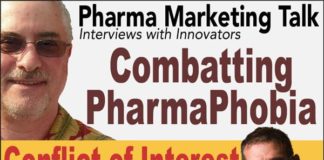New Media Tracking Technologies Implications for Online Consumer PrivacyClick Here for Additional Resources
A conversation with Jeff Chester (See guest bio), Founder and Executive Director of the Center for Digital Democracy, about his organization’s recently filed brief with the FTC requesting an “Investigation, Public Disclosure, Injunction, and Other Relief” regarding the array of sophisticated and non-transparent interactive marketing applications utilized by healthcare companies and the pharmaceutical industry to promote drugs online..
Aired LIVE on: Thursday, 9 December 2010. Listen to internet radio with Pharmaguy on Blog Talk Radio
You may also visit this Pharma Marketing Talk Segment Page to listen to the audio podcast.
This show and ALL Pharma Marketing Talk shows are available as podcasts via PMT on iTunes (FREE!).
BackgroundAccording to a CDD Press Release (see Additional Resources):
In a complaint filed on November 23, 2010, with the Federal Trade Commission, the Center for Digital Democracy, U.S. PIRG, Consumer Watchdog, and the World Privacy Forum called on the commission to investigate unfair and deceptive advertising practices that consumers face as they seek health information and services online. Consumers now confront a sophisticated and largely stealth interactive medical marketing apparatus that has unleashed an arsenal of techniques designed to promote the use of specific brand drugs and influence consumers about treatments for health conditions. Much of the online health marketing system has been deliberately structured to collect personal information and other data on consumers, including through the use of free e-newsletters on specific medical concerns; discounts for prescription drugs and services; and via the growing number of other online data profiling techniques. Nearly $1 billion dollars will be spent this year by online health and medical marketers targeting the growing number of U.S. consumers who increasingly rely on the Internet for information about medical problems, treatments, and prescription drugs.
The online marketing health industry has presented to the FDA and the public a fairytale version of digital marketing, where all consumers become empowered “e-patients,” able to form powerful helping communities. But while the online medium provides medical information to those seeking access to resources and support, it has been structured to engage in aggressive tactics that threaten privacy, raise questions about the fair presentation of independent information, and advance the sales of prescription drugs and over-the-counter products. Pharma and other health online marketers are pressing the FDA for new rules that would allow them to expand digital and social media advertising. Before the FDA acts, it should await an investigation and a report by the FTC.
Questions/Topics Discussed- Many people, including myself, have asked why CDD chose to focus its complaint on the health/drug industry when the advertising techniques mentioned are used by all sorts of industries?
- Some of the companies whose practices you cite — such as Alliance health — have responded and said “We do not sell any consumer data to marketers — either identified or de-identified — without the consumer’s expressed consent around a specific, highly relevant offer.” They also claim that they give members “complet control over their privacy.” Is that sufficient in your view? If not, why not?
- What do you think of FTC Privacy Report recommending a “Do Not Track” option for Web browsers and Microsoft’s recent decision to implement that in a new version of its Internet Explorer browser?
Guest Bio
 Jeff Chester has been an important force in public-interest media issues for more than twenty years. He is one of the nation’s leading advocates working on telecommunications issues. In 1996, Newsweek magazine named him one of the Internet’s fifty most influential people. His first book, Digital Destiny: New Media and the Future of Democracy, was released in January 2007. A former investigative reporter and filmmaker, he has long been at the forefront of the fight against consolidation and commercialization of the U.S. media system.
Jeff Chester has been an important force in public-interest media issues for more than twenty years. He is one of the nation’s leading advocates working on telecommunications issues. In 1996, Newsweek magazine named him one of the Internet’s fifty most influential people. His first book, Digital Destiny: New Media and the Future of Democracy, was released in January 2007. A former investigative reporter and filmmaker, he has long been at the forefront of the fight against consolidation and commercialization of the U.S. media system.
He received his MSW in Community Mental Health from UC Berkeley in 1978 and his BA in psychology from California State University, San Francisco in 1975.
Additional Resources
- New Media Privacy Issues & Online Health Marketing: Pharma Marketing News article
- Is Your Digital Marketing Solution Mentioned in the CDD Brief? It Should Be!









![6 Digital Tools at the Center of Healthcare Digitalization [INFOGRAPHIC]](http://ec2-54-175-84-28.compute-1.amazonaws.com/pharma-mkting.com/wp-content/uploads/2021/04/6DigitalTools_600px-100x70.jpg)




